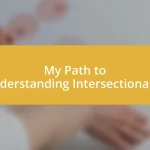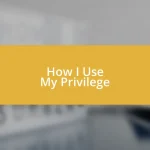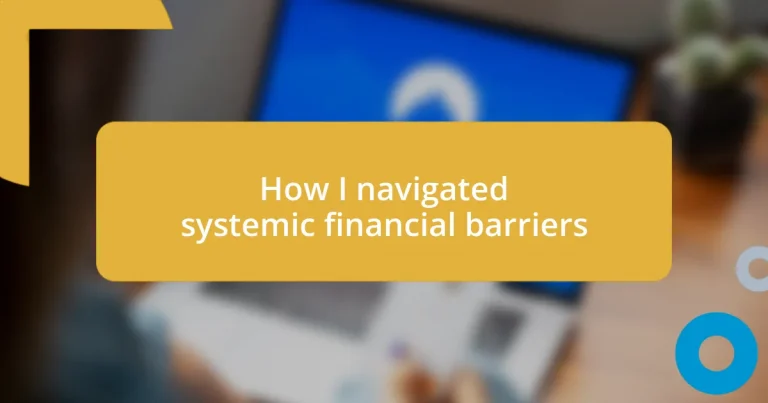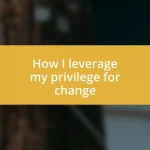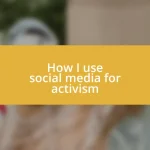Key takeaways:
- Systemic financial barriers hinder access to opportunities for marginalized communities, affecting both financial and emotional well-being.
- Identifying personal financial challenges requires reflection on credit, debt, budgeting, and income disparities.
- Community resources, such as workshops and local programs, provide valuable support and education in financial literacy.
- Building a supportive network and seeking professional advice can empower individuals to overcome financial obstacles and achieve their goals.
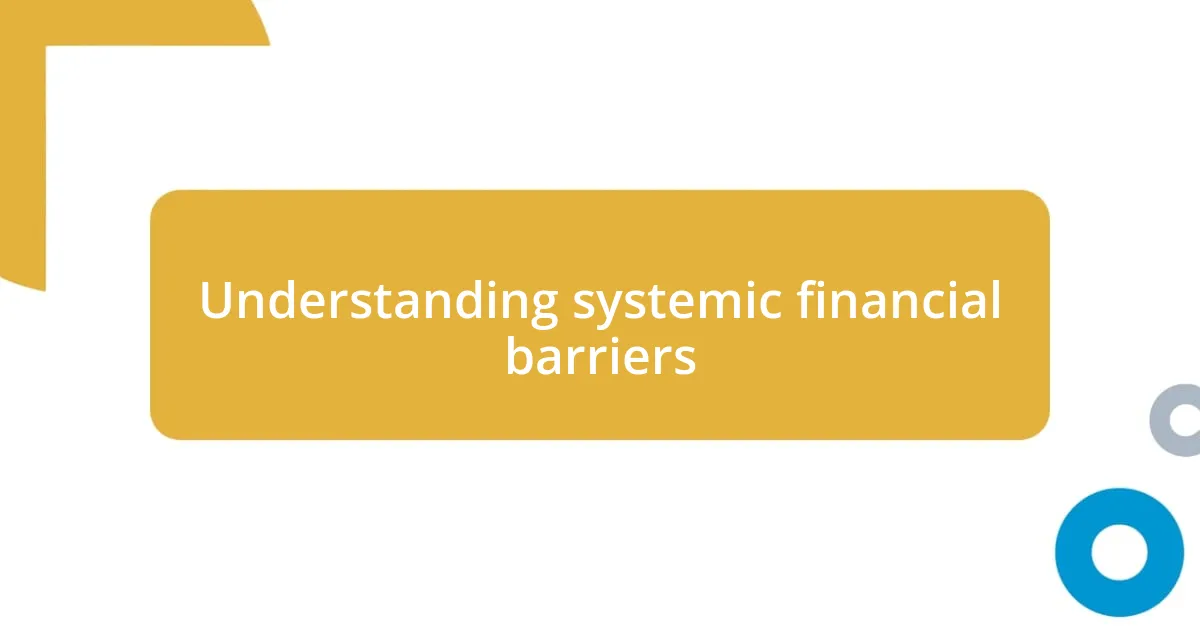
Understanding systemic financial barriers
Systemic financial barriers are like invisible walls that prevent many individuals from accessing opportunities and resources. I’ve experienced this firsthand. I remember trying to secure a loan for my first business venture only to realize that my background and credit history, which were shaped by circumstances beyond my control, put me at a severe disadvantage. It made me wonder: how can one truly succeed when the very system designed to support growth seems rigged against certain individuals?
These barriers often stem from a complex interplay of policies, societal norms, and historical disadvantages that disproportionately affect marginalized communities. I can’t help but think about the countless talented individuals who have brilliant ideas but lack the funding or mentorship to bring them to fruition. It’s disheartening to see potential wasted because the current financial landscape favors those already in a position of advantage.
What’s particularly frustrating is the way these barriers manifest not just as financial issues, but as emotional ones too. I recall a moment when I was searching for funding; the feeling of rejection time after time wore me down, making me question my worth and capabilities. It’s a painful cycle that leaves many feeling powerless and demotivated. How can we expect innovation and diversity in business if these systemic obstacles continue to thrive?
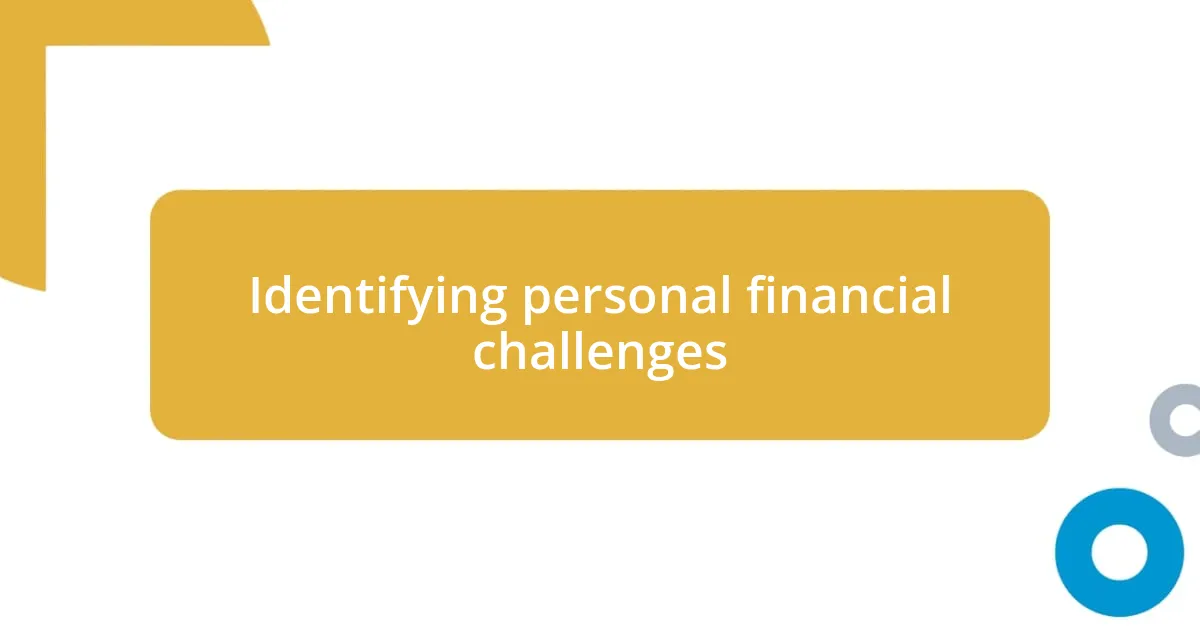
Identifying personal financial challenges
Identifying my personal financial challenges was a journey in itself. I often found it tough to pinpoint exactly what was holding me back. Was it the limited access to credit? Or perhaps the overwhelming burden of student loans? Through reflection, I began to see a clearer picture, shaped not just by my circumstances but by perceptions I had internalized over time.
To effectively identify financial challenges, consider these aspects:
- Credit Score Confusion: I vividly remember staring at my credit report, feeling lost and frustrated. Understanding how my credit history impacted loan approvals opened my eyes.
- Debt Awareness: Tracking my student loans felt like a never-ending task. The realization of how much I owed was a wake-up call, prompting me to take action.
- Budgeting Difficulties: I had to confront my spending habits, which often felt like a balancing act. Identifying where I was overspending was essential for finding relief.
- Income Disparities: I noticed how my job didn’t align with my financial goals. It was a hard truth, recognizing that I needed to seek better opportunities to bridge the gap.
Looking back, these steps helped me to not only identify my challenges but also to understand the emotions tied to each one.
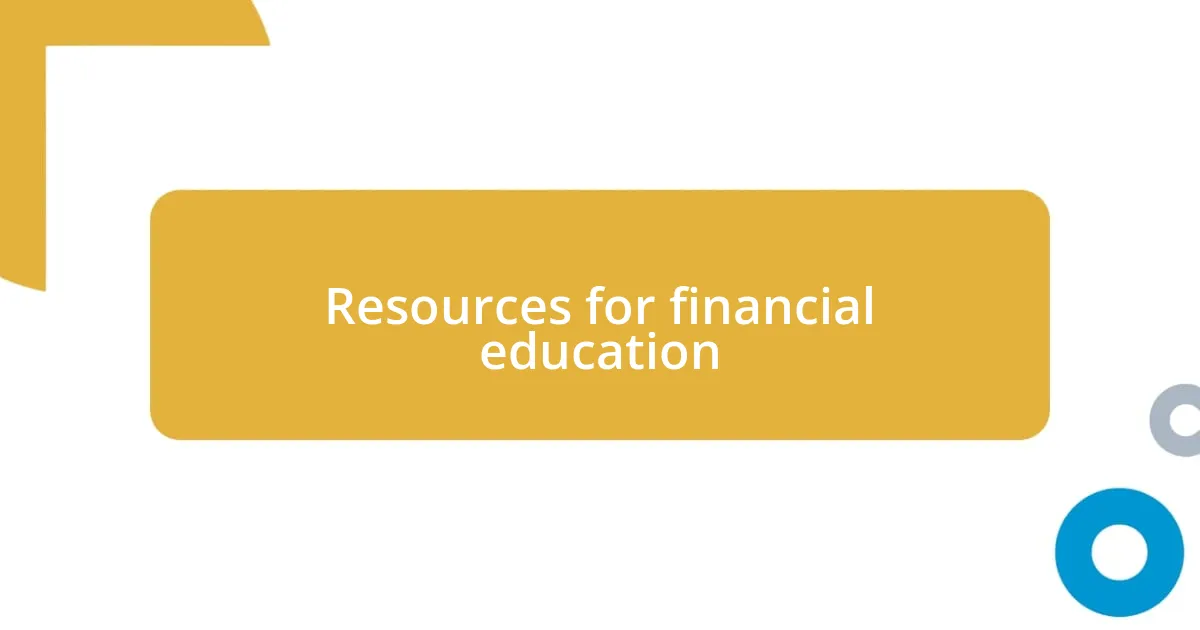
Resources for financial education
Understanding and utilizing resources for financial education can significantly change one’s outlook on personal finance. I remember when I first stumbled upon a community workshop designed to teach basic budgeting skills. It was eye-opening to interact with others sharing similar struggles. I learned practical techniques for tracking expenses and creating a budget that fit my lifestyle. This experience emphasized the importance of community support in enhancing financial literacy—something I didn’t realize I desperately needed.
Online courses and podcasts can also serve as valuable tools for financial education. I found that listening to expert discussions on platforms like YouTube helped clarify complex topics like investing and retirement planning. These resources made learning accessible and engaging, allowing me to explore financial principles on my own time. I often think about how these easily digestible formats could benefit anyone feeling overwhelmed by traditional learning methods.
When comparing various educational resources, each offers unique advantages. Some provide in-depth tutorials, while others foster interactive discussions. It’s crucial to pick resources that resonate with your learning style and needs.
| Resource Type | Benefits |
|---|---|
| Community Workshops | Hands-on experience, peer support |
| Online Courses | Structured learning at your own pace |
| Podcasts | Engaging discussions, easy to digest |
| Books | Comprehensive knowledge, varied perspectives |
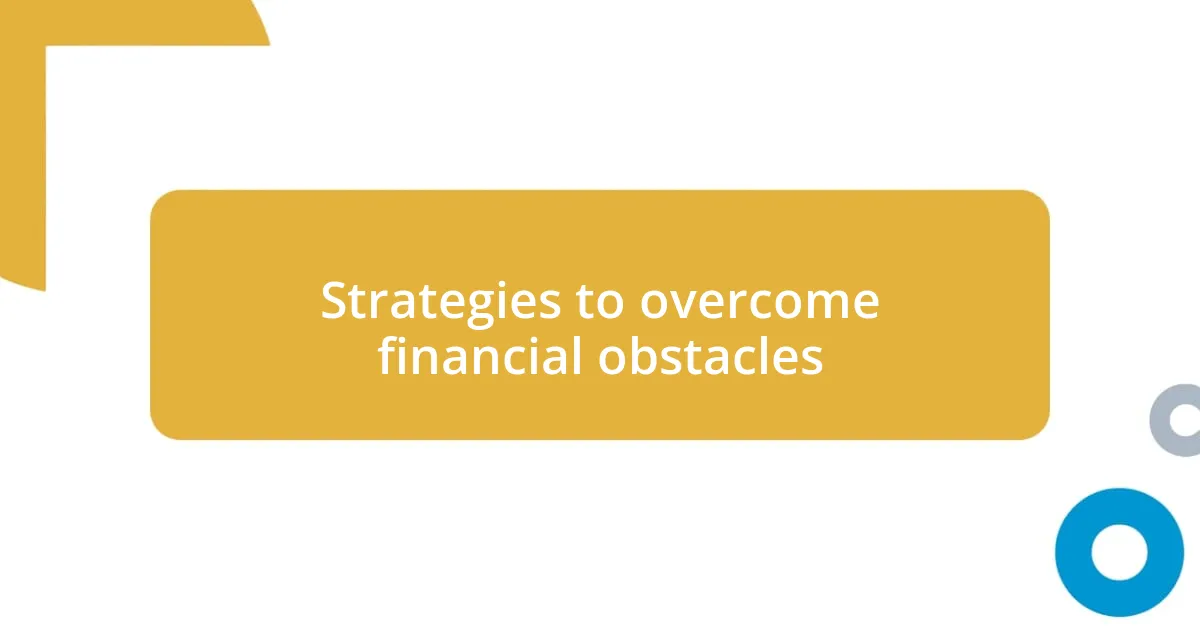
Strategies to overcome financial obstacles
Finding ways to overcome financial obstacles has been a transformative journey for me. One strategy that really worked was setting realistic financial goals. As I started to articulate what I truly wanted, whether it was saving for a trip or paying off credit cards, I felt a sense of empowerment. By breaking down these larger goals into smaller, manageable steps, I could celebrate each little victory along the way. Does this resonate with you? Sometimes, it’s those small wins that fuel our motivation.
Another approach I’ve found effective is seeking professional financial advice. I remember the first time I sat down with a financial planner. It felt daunting, but once I shared my concerns, I realized how much clarity they could provide. Engaging with someone who understood the nuances of financial products was eye-opening. They helped me navigate options I hadn’t considered, showing me that there are paths available that I could take. Have you ever thought about seeking professional help to tackle your finances? I highly recommend it; the insight can be invaluable.
Lastly, I embraced the concept of a support network. Surrounding myself with like-minded individuals who shared similar financial goals made a huge difference. I began attending local meetups and online forums, where I could share struggles and strategies. I remember feeling lost in the early days, but finding a group that cheered you on can feel like a breath of fresh air. Is there a community you could turn to? Building connections can help you stay accountable and find encouragement during tough times.
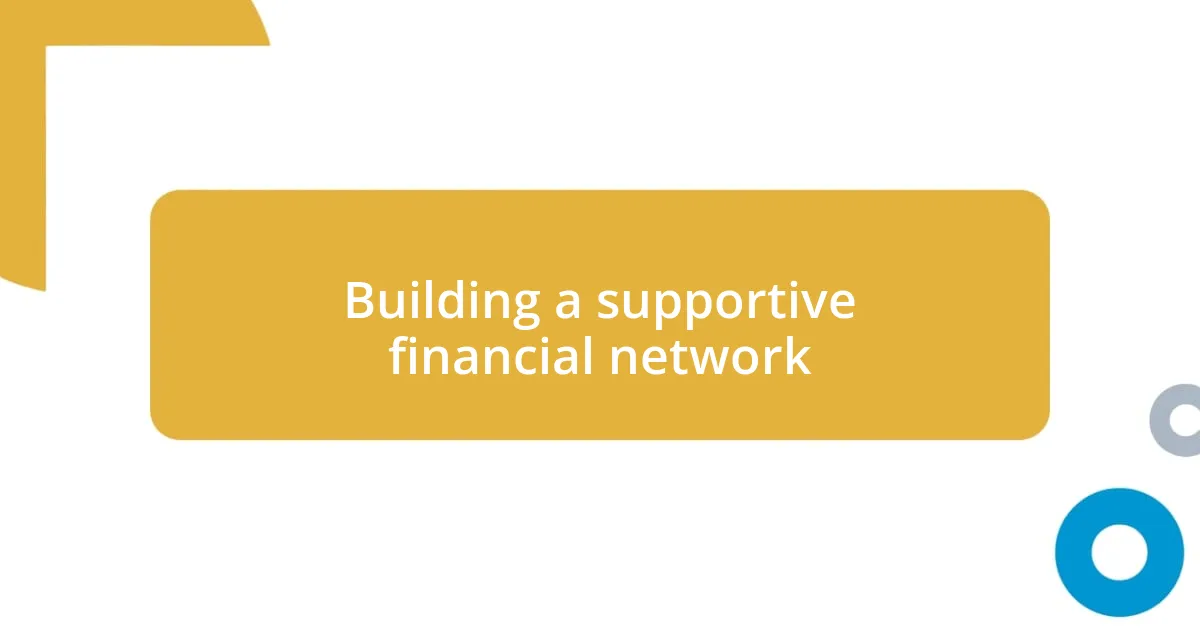
Building a supportive financial network
Building a supportive financial network was a game changer for me. I remember the first time I joined a group of people discussing financial wellness. It felt like discovering a treasure chest of shared experiences. Each story revealed different strategies, and I realized I wasn’t alone in my struggles. Have you ever felt that rush of relief when you find others facing similar challenges?
Reaching out to mentors made a significant impact as well. I was fortunate to connect with someone who had successfully navigated financial hardships. Their willingness to share advice and personal anecdotes gave me a fresh perspective. Through our conversations, I learned about approaching my finances with a holistic view, encompassing everything from budgeting to investing. Think about it: who in your life could provide that insight and encouragement? Sometimes, all it takes is one connection.
I also actively participated in online communities, which opened new doors for my financial education. I recall a late-night chat in a forum that tackled credit scores; each comment sparked new ideas and clarifications. These virtual spaces became my sounding board—where I could express doubts and receive immediate support. Have you considered diving into online discussions? They can be incredibly empowering and often lead to rewarding friendships that extend beyond finances.
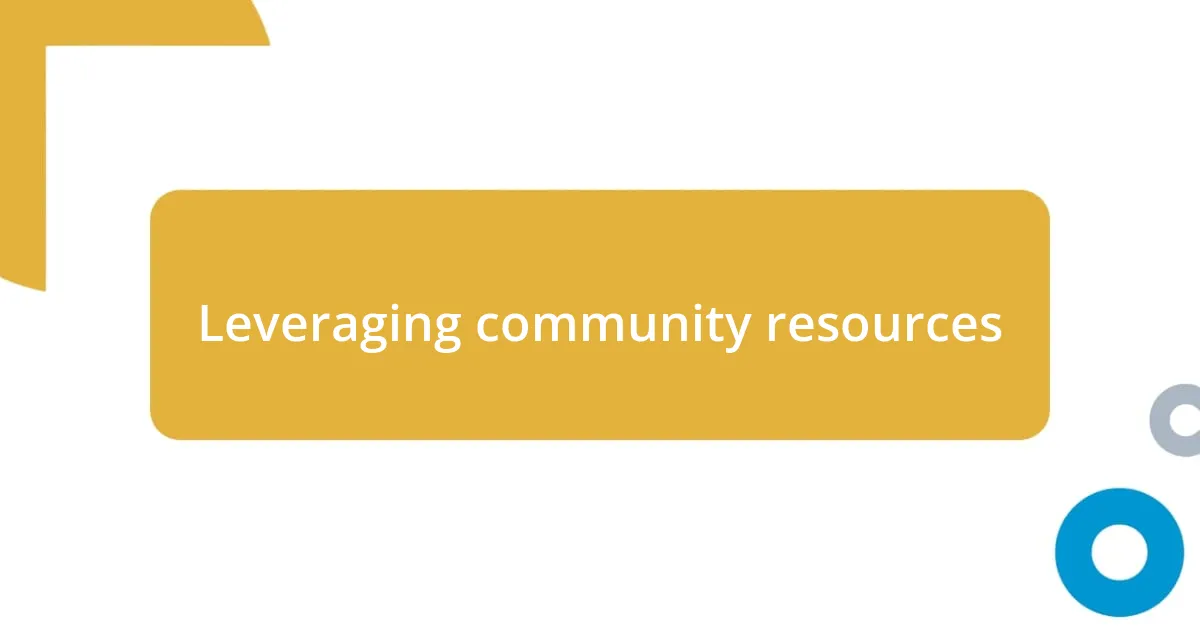
Leveraging community resources
Leveraging community resources was vital in my journey through financial hurdles. I vividly recall the time I attended a local workshop hosted by a nonprofit organization focused on financial literacy. Listening to community leaders share their knowledge not only expanded my understanding of budgeting but also inspired me. Has there ever been a moment when you felt a sudden shift in perspective? For me, those workshops were like eye-openers, revealing resources I never knew existed.
I also became more intentional about visiting my local library, where they offered free financial counseling sessions. I’ll never forget the first session: I walked in feeling overwhelmed but left with a newfound sense of direction. The counselor provided practical tools tailored to my situation, and I realized community resources are often just a phone call or a visit away. Have you checked out your local library’s offerings? You might be surprised by how much support is available to you.
Connecting with local food banks and economic assistance programs was another way I utilized community resources. During a particularly tight month, I reached out to a nearby food bank, which not only helped me with groceries but also pointed me toward financial aid programs I didn’t know about. That experience opened my eyes to how interconnected financial stability and community support can be. Could there be resources in your neighborhood that you haven’t yet explored? Sometimes, tapping into these community ties can lead to unexpected and helpful solutions.
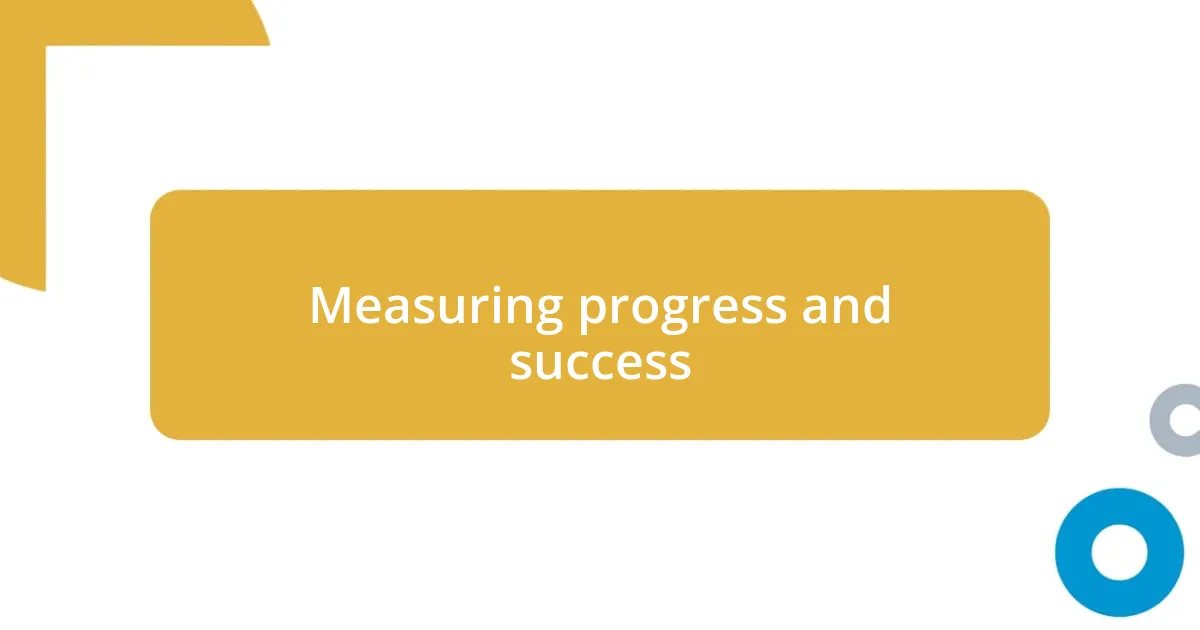
Measuring progress and success
Measuring progress took on many forms for me, from simple milestones to big financial wins. I set specific goals like saving a certain amount each month. Over time, these targets transformed the abstract concept of progress into concrete experiences that felt rewarding. Have you ever tracked your achievements and felt a sense of pride? I can genuinely say that each small victory motivated me to strive for more.
Reflection played a crucial role in how I gauged success. I began journaling my financial journey, noting setbacks alongside victories. It was eye-opening to see how far I’d come, even on the days when it felt like I was just treading water. Each entry became a testament to resilience, allowing me to celebrate progress I might have otherwise overlooked. Have you considered documenting your journey? This practice can reveal patterns and empower you through tough times.
Another key indicator of success for me was the shift in my mindset about money itself. I transitioned from seeing finances as a source of anxiety to viewing them like a puzzle to be solved. Every new piece of knowledge brought me clarity and confidence. I remember a moment of realization during a budgeting session when I truly understood how each expenditure aligned with my values. Has there been a moment for you when a financial concept just clicked? Those moments are invaluable in charting your progress and embracing your financial journey.





